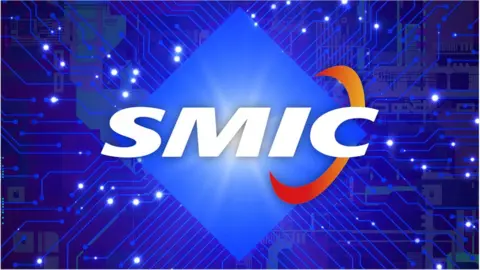US turns up heat on China's biggest chip-maker
 Getty Images/SMIC
Getty Images/SMICThe US has added China's biggest computer chip-maker SMIC to a list of "Chinese military companies", putting further pressure on the company.
The move by the Department of Defense means US investors are now barred from holding or trading shares in SMIC.
It said the Chinese government was using the expertise of "civilian entities", such as companies and universities, to modernise its military capabilities.
SMIC has denied any military links.
The company now falls under an executive order signed by President Donald Trump in November, which sought to prevent US capital from funding the modernisation of China's military.
SMIC has previously said some of its US suppliers have been issued with letters telling them they will be subject to new export restrictions.
This suggests the US Department of Commerce may add the company to its trade blacklist, known as the entity list, although it has not yet published such a decision.
If that happens, it could have a significant impact on chip production.
"Seeing as SMIC is dependent on sourcing from US companies in order to be able to manufacture silicon chips, this puts SMIC's business in the hands of the Department of Commerce, which can decide whether to issue licences on a case-by-case basis," said Richard Windsor, founder of research firm Radio Free Mobile.
"The added designation of SMIC as being owned or controlled by the Chinese military does not change the situation, other than to make it harder to get a licence, make it more likely to be added to the entity list and result in diminished demand for its shares as US investors will no longer be able to buy them."


This is another sign that the Trump administration intends to use its final days to continue to crank up pressure on China and try and lock in a hard-line policy for the incoming Biden administration.
The definition of what constitutes supporting the military may be interpreted broadly and is open to dispute - but Washington is using it as a lever in the battle over chips - a key area of technological competition.
Washington knows this is one area that China is relatively behind in and is desperate to catch up on.
The Trump administration will also be counting on it being hard for a Biden administration to be seen to roll back measures for fear of being accused of going "soft" on Beijing.

Restrictions
SMIC was founded in 2000, and has since become the most prominent chip-making foundry in mainland China.
However, its most advanced products are said to lag two generations behind what rival manufacturers - including Taiwan Semiconductor Manufacturing Company (TSMC) and South Korea's Samsung - are capable of.
SMIC cannot currently make transistors as small as are made by those rivals, so it cannot produce state-of-the-art processors for the latest smartphones and other advanced gadgets.
The reason for this is, in part, due to existing restrictions the US has imposed on the firm.
At present, the only way to make the most advanced logic chips is to use equipment made by a Dutch company, ASML.
SMIC had ordered a $150m (£111m) lithography machine - which uses lasers focused by giant mirrors to print minuscule patterns on silicon - from ASML in 2018. But Reuters reported the White House convinced the Dutch government to block the export on security grounds.
A spokesman for ASML declined to comment when asked by the BBC whether the deal was still in limbo.
SMIC has told the BBC: "SMIC manufactures semiconductors and provides services solely for civilian and commercial end-users and end-uses. The company has no relationship with the Chinese military and does not manufacture for any military end-users or end-uses."
